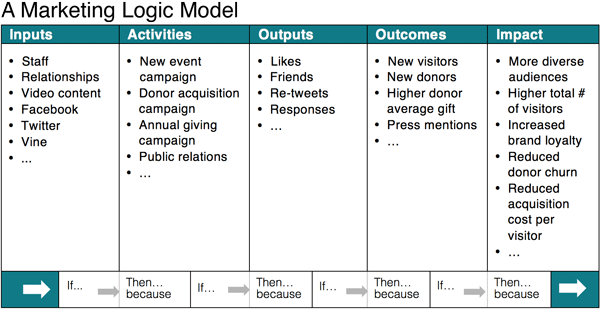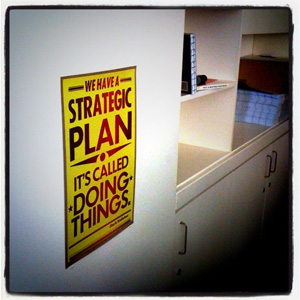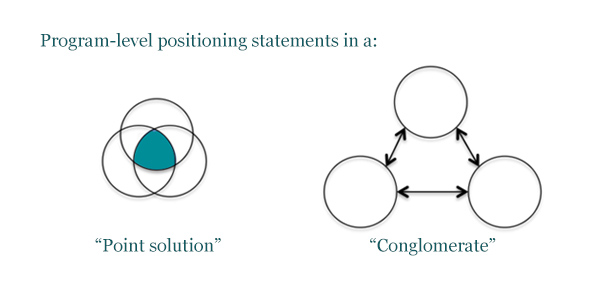I’ve been doing some extra reading on social media, online marketing, and online experiences as we prepare for our first presentation of Digital Strategies in Denver in October. One of the readings we are using, “Can You Measure the ROI of your Social Media Marketing?” got me thinking. The authors surface the classic problem in marketing: how do you demonstrate that specific communications tactics generate the sales, visitors, new audiences, new donors, and other business results you want? What got me thinking was the shape this problem takes … [Read more...]
The Possibilities of a Children’s Art Museum
Last weekend my daughter and I spent the morning at the National Zoo. She turns three later this summer and this was our fifth trip to the zoo since the weather turned nice this spring. Every visit is so different from the last one, even when our path is the same. I never know where she will decide to spend her time. This weekend it was the Amazonian House (a fortuitous side trip that started on the hunt for a potty). Kira was enthralled by the blue frogs, snakes, river fish and stingrays. And I loved discovering how few things she naturally … [Read more...]
Three Strategic Planning Challenges
I’ve been part of a group helping the Association of Arts Administration Educators (AAAE) review their guidelines for graduate-level education in strategic planning. I’ve found myself thinking about three challenges in strategic planning that we see in our work, and I wanted to release these thoughts into the wild and see what happens. On the one hand, I hope raising these questions sparks your thinking about your strategic planning challenges. On the other, I (and I have no doubt our entire community) would love to hear stories about how you … [Read more...]
A Single Customer Promise?
There is a question we get all the time in our Strategic Marketing seminar: should an organization be able to create a single positioning statement for the entire organization to summarize its value promise, or should it have a collection of positioning statements for different programs and target audiences? This always leads to interesting discussion but I've never felt we had a galvanizing way to answer the question. Earlier this week, Gail Crider and I were working on the design for a program in cultural entrepreneurship for a potential … [Read more...]
Collective Impact
As in other nonprofit sectors, most energy and resource in our sector is focused on what the authors call "isolated impact" at the organizational level. Can the full value of arts and culture in society, to enhance lives and deepen democracy, be realized through this approach or do these complex possibilities need a different strategy? When discussion in the cultural field turns to collective action, it tends to turn toward lobbying and advocacy and changing public opinions of the arts. This article suggests a different focus for collective … [Read more...]
Shut Up and Take My Money: Fans Should Hire Artists
We've been having some interesting discussions with cultural leaders about the relevance of cultural organizations in their current forms. This article adds some food for thought. Kickstarter and similar crowdfunding sites are becoming platforms for "intermediaries" as well as artists and producers. Individuals are taking on the roles of commissioning, producing, and presenting new work and events. Could your organization's role or model be replaced by a pro-am, freelance model given the new platforms? If not today, are trends pointing towards … [Read more...]
Charities’ Zero-Sum Filing Game
The minimalist ratings of nonprofit organizations, using overhead and fundraising ratios, are deeply flawed. Are we collectively making the situation worse by shaving the numbers? A recent study found that over 40% of nonprofits report zero fundraising expenses, which suggests nonprofits can't be trusted to share information in the public interest and the rating agencies are all that more essential. Our collective actions are feeding the current system rather than demonstrating its irrelevance through honest, open and more comprehensive and … [Read more...]
Putting the community in control of programming
A startup company, Tugg, has an interesting take on allowing the community to "pull-through" programming for movie theaters. The service is still in beta testing so its reach and types of participants are limited for the moment, but it is interesting to imagine where it could go. What could a similar community-driven approach mean for your organization? How would you translate your organization's role in a community-led model where you are a facilitator rather than the central decision maker? Tugg, The Social Movie Theater Startup, Uses … [Read more...]
Don’t throw that home run ball back!
A bit of a longer leap than usual, but stick with me for a moment. Baseball fans have taken to throwing back home runs hit by the opposing team, a practice this author decries as "the worst tradition in baseball." This article on the trend made me think about one of the challenges we face every day in arts and culture. The author is speaking as an expert, as a connoisseur of baseball. For him, you should keep the home run ball hit by your opponent because, in the bigger picture, it is a great souvenir. If you love baseball, you know the … [Read more...]
Orchestras at the Cross Roads
Jesse Rosen, President and CEO of the League of American Orchestras, provides a clear-eyed view of the challenges facing orchestras in his plenary remarks from the League conference this month. The fundamental issues he highlights in community relevance, governance, stakeholder cooperation, and financial "clarity" are important considerations for cultural leaders in all disciplines. … [Read more...]
IBM’s Centenary: The Test of Time
This article (IBM's centenary: The test of time | The Economist) is a great reminder (or introduction) to the way in which organizations can limit their opportunities by thinking about their purpose too narrowly. "IBM’s secret is that it is built around an idea that transcends any particular product or technology... Building a company around an idea, rather than a specific technology, makes it easier to adapt when industry 'platform shifts' occur." In the arts the "mission" is the broader "idea" to which arts organizations are committed, and … [Read more...]
YouTube – Eli Pariser: Beware online “filter bubbles”
Eli Pariser, the former Executive Director of MoveOn.org and their current Board Chair, highlights the hidden and growing impact of online filters on Google, Facebook, and throughout the internet in this TED video. These filters give greater and greater weight to the information a person tends to look at online first. Over time the algorithms filter out less frequent interests, to the point that publications, people, and ideas are no longer presented at all. What might this mean for the arts? The most passionate arts supporters should hear … [Read more...]
Give Smart: Philanthropy that Gets Results
We often talk about strategy, competitive advantage, and differentiation from a traditional business perspective in our work. We consider these concepts essential for arts leaders given the range of competitors cultural organizations face today for money, attention, and time. We also consider this understanding essential for effective collaboration across arts organizations: each player in the community needs to know exactly what they do best and what unique benefit they contribute to the cultural "ecosystem," so together they can assemble … [Read more...]
OpenIDEO – Home
IDEO, as you may know (including those of you who have studied the organization in one of our seminars) is one of the world's top product design firms. OpenIDEO is their open innovation site where they use crowdsourcing to develop ideas for addressing social issues. The site is interesting in its own right, but I wanted to highlight it because it is such an interesting example of an organization finding a way to embody in technology the thing that is unique about them, and use technology to extend that experience to a much larger audience. … [Read more...]
Rethinking Capitalism
In this video interview on Rethinking Capitalism, Michael Porter (of Porter's Five Forces fame, among other things) shares an interesting take on the new nature of relevance for organizations in society. Porter argues that the old standby "what's good for business is good for society" that has defined the relationship between U.S. business and society is giving way. He turns this on its head, arguing "what is good for society is good for business." For most people in our sector, the traditional capitalist argument probably never held sway. … [Read more...]




